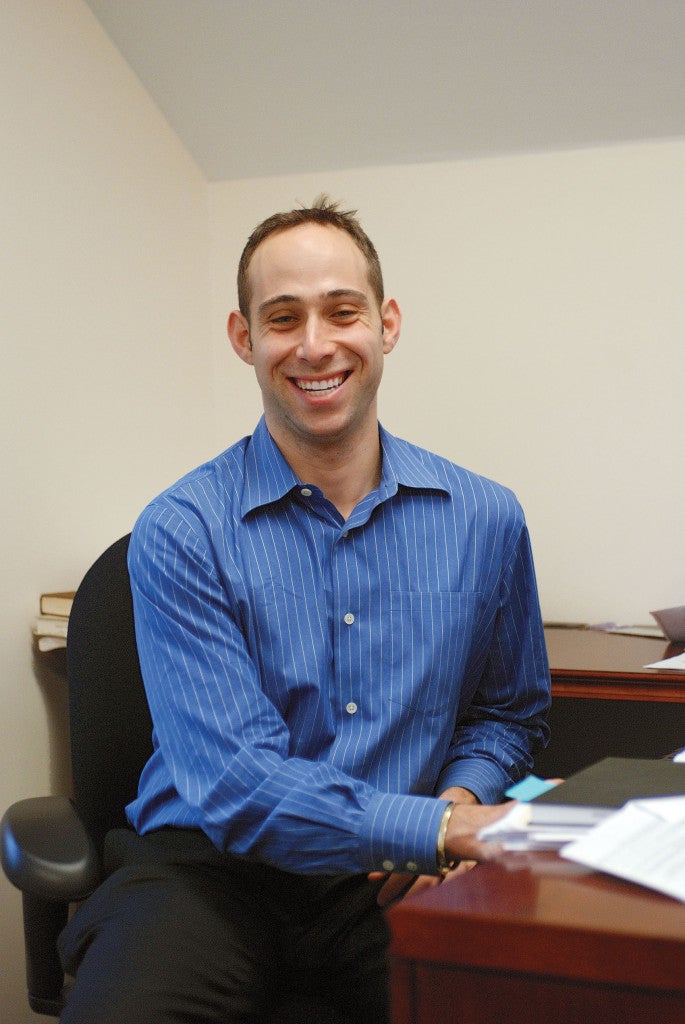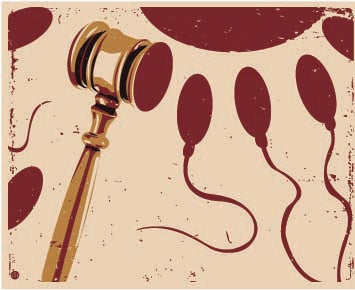What if the government forced all citizens to get genetic testing to find out if they were carriers of a deadly disease such as Tay-Sachs? “Any constitutional problem with that?” I. Glenn Cohen ’03 asks the 25 students in his popular course, Genetics and Reproductive Technology: Legal and Ethical Issues, as he paces before the blackboard in a Hauser classroom.
“It seems obviously unconstitutional,” answers Aaron Karp ’09.
“I wouldn’t start a Supreme Court argument like that,” advises Cohen, as the class erupts in good-natured laughter. “What cases would you rely on?”
“Griswold,” Karp answers. “The privacy case.”
“You think it flows ineluctably from that case,” Cohen states.
“Yes,” Karp responds. “That and all the others we’ve been talking about for the last few weeks.”
Cohen smiles wryly. “‘Your honor, I hereby incorporate the last 10 cases we’ve studied,’” he teases.
The tone may be light and the discussion lively. But the subject matter in Cohen’s class is serious—sometimes deadly serious. It addresses such emotionally charged issues as wrongful birth, wrongful life, cloning, fertility tourism, abortion, “savior siblings,” and other matters on the frontier of reproductive technology and genetics, including the creation of DNA databanks for forensic use and the ownership of genetic information. Cohen, an assistant professor of law and a former fellow at the Petrie-Flom Center for Health Law Policy, Biotechnology, and Bioethics at HLS, is an expert in bioethics and health law. He’s also energetic, approachable, and eager to get students to think through these thorny issues. He wants them to view his class as “an intellectual playground,” where they learn to make strong arguments on behalf of conclusions they find repugnant and to attack ideas they hold dear.
Caitlin Vogus ’10 says she’s troubled by the idea of government-mandated testing. “It puts a lot of pressure on people who have that information to go through with an abortion if they have Tay-Sachs,” she says. “You say you’re free to ignore it, but how free are you, really?”

“Is the state responsible for that pressure?” Cohen asks. “The state is saying, ‘I’m just giving you the information! Let the lynch mob outside lean on you.’”
Yvette Chua LL.M. ’09 disagrees. “Why would the state mandate testing if it didn’t have the underlying goal to create pressure to encourage abortion?” she argues. “So that’s why it’s unconstitutional.”
Cohen pushes back. “The government is just forcing you to get information that may have bearing on whether you transmit a disease to another person,” he says. “Isn’t that similar to the situation where a person has a contagious disease, and the government quarantines them?”
The hour and a half flies by, with the discussion skillfully guided by Cohen and each student speaking at least once. Today’s class focuses on issues related to genetic screening for certain diseases, including what to do with that information once it’s obtained. Should there be a right to an early-stage abortion no matter what the reason? What if parents choose to terminate a pregnancy because the fetus carries indicators associated with being gay? Unintelligent? Deaf? A poor athlete? If the ability to select individual traits of children might result in a lack of genetic diversity, does the state have a right to prevent genetic testing? Or can it permit testing solely for diseases, such as Tay-Sachs?
“Let’s say the state mandated genetic testing on everyone,” suggests one student. “I wonder if, later in life, the state might say, ‘We’ll no longer pay disability benefits because we warned you in advance and you still chose to have the kid.’”
After class, students linger to talk with Cohen. One of them, Jeannie Austin, is getting a master’s degree in global health law at Georgetown and is a visiting student at HLS this year. She says she feels very lucky to be in the course.
“Science is so far ahead of the law in this area,” she reflects, “that we need to make arguments on an ethical basis as well as legal, to help the courts make better-informed decisions about the issues they’re confronting because the laws in many cases are being used in areas for which they were not intended.”
